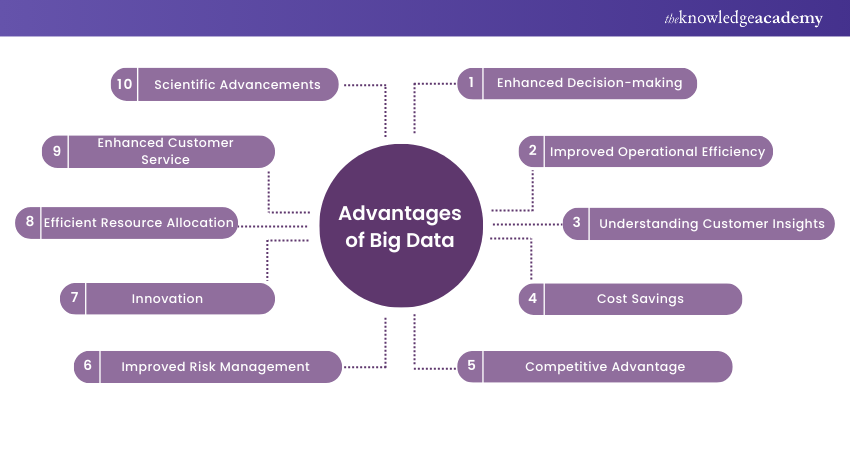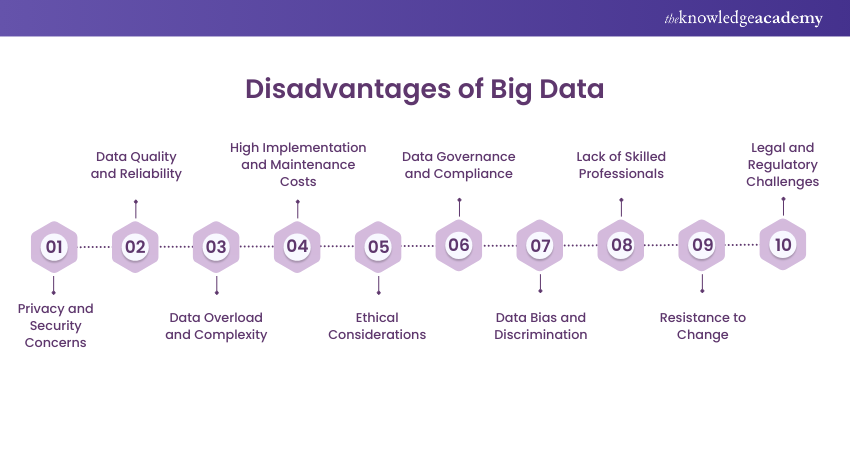We may not have the course you’re looking for. If you enquire or give us a call on +0800 780004 and speak to our training experts, we may still be able to help with your training requirements.
We ensure quality, budget-alignment, and timely delivery by our expert instructors.

Picture this- a retail company struggling to understand customer preferences due to the sheer volume of data generated daily. By leveraging Big Data, they uncover patterns and trends that revolutionise their marketing strategies and boost sales. But what are the Advantages and Disadvantages of Big Data that make it such a powerful yet challenging tool? How can organisations navigate its complexities to reap its benefits?
In this blog, we will delve into the Advantages and Disadvantages of Big Data. From enhanced decision-making to privacy concerns, Big Data is a double-edged sword. Let’s dive in and explore its potential and pitfalls.
Table of Contents
1) A Brief Introduction to Big Data
2) How can Organisations use Big Data?
3) Advantages of Big Data
4) Disadvantages of Big Data
5) Conclusion
A Brief Introduction to Big Data
Big Data is transforming today’s digital landscape by offering vast and complex data sets that provide immense potential for businesses. With its massive volume, high velocity, and diverse variety, Big Data further enables organisations to gain insights, make informed decisions, and drive innovation. The three crucial factors impacting Big Data are:
1) Data Management: Managing large volumes of data necessitates advanced infrastructure and tools for storage, processing, and security. Effective data management ensures data is accessible, reliable, and secure.
2) Privacy and Security: As data volumes grow, maintaining privacy and security becomes essential. This involves protecting sensitive information from breaches and adhering to regulatory standards.
3) Data Quality: Accurate and reliable data is vital for meaningful analysis and decision-making. Poor data quality might lead to incorrect insights and flawed business strategies.
How can Organisations use Big Data?
Organisations can use Big Data in order to discover hidden value propositions and make strategic moves. Some of the Big Data benefits include the ability to use different forms of analytics and tools to obtain large volumes of data from different sources in an endeavour. In combination with improved performance and productivity, organisations can define objectives in which costs can be reduced.
Furthermore, Big Data helps organisations achieve customer-specific experiences and improvements in product development as well as strategic advantage. By using Big Data, organisations can base their information driven decisions, as well as come up with new solutions to counter competition in a complex and competitiveness driven market environment.
Become an expert in navigating the complexities of Big Data – sign up for our Big Data Analysis Course now!
Advantages of Big Data
First, we will look into the advantages of Big Data:

1) Enhanced Decision-making: Big Data provides organisations with access to a vast amount of information from various sources, enabling them to make data-driven decisions. By analysing trends, patterns, and correlations within the data, businesses can seek valuable insights that guide their strategies.
2) Improved Operational Efficiency: Big Data analytics helps organisations optimise their operations by identifying inefficiencies, bottlenecks, and areas for improvement. By streamlining processes and workflows, businesses can enhance productivity, reduce costs, and deliver better results.
3) Personalisation and Customer Insights: Big Data enables organisations to understand their customers at a deeper level. By analysing customer data, businesses can identify preferences, behaviours, and needs, allowing them to personalise products, services, and marketing campaigns to enhance the customer experience.
4) Cost Savings: Big Data analytics can uncover cost-saving opportunities for organisations. By analysing data related to operations, supply chains, and resource allocation, businesses can identify areas where costs can be minimised, such as optimising inventory management or reducing energy consumption.
5) Competitive Advantage: Leveraging Big Data effectively can provide organisations with a competitive edge. By analysing market trends, consumer behaviour, and competitor data, businesses can identify new opportunities, innovate, and stay ahead of the competition.
6) Improved Risk Management: Big Data analytics helps organisations identify and mitigate risks. By analysing historical and real-time data, businesses might anticipate potential risks, such as fraud, cybersecurity threats, or supply chain disruptions, and implement proactive measures to address them.
7) Innovation and Product Development: Big Data fuels innovation by giving insights into market demands, customer preferences, and emerging trends. Organisations can leverage these insights to develop new products, enhance existing ones, and align their offerings with evolving customer needs.
8) Efficient Resource Allocation: With Big Data analytics, organisations can optimise resource allocation. Businesses can allocate their resources effectively by analysing data related to resource utilisation, demand forecasting, and operational efficiency, reducing waste and maximising productivity.
9) Enhanced Customer Service: Big Data enables organisations to deliver exceptional customer service. By analysing customer interactions, feedback, and sentiment data, businesses can identify areas for improvement, personalise customer support, and proactively address customer issues.
10) Scientific and Social Advancements: Big Data is crucial in scientific research and social advancements. From healthcare to climate change, analysing large datasets helps researchers uncover insights, make breakthroughs, and address complex challenges that impact society.
Register for our Big Data Analytics & Data Science Integration Course and learn how to seamlessly combine analytics with Data Science!
Disadvantages of Big Data
Now that you know its advantages, we will expand on the Disadvantages of Big Data:

1) Privacy and Security Concerns: The accumulation and examination of extensive data sets raise privacy and security concerns. Organisations must implement robust data protection measures to secure sensitive information and comply with relevant regulations to ensure individuals’ privacy is maintained.
2) Data Quality and Reliability: Big Data poses challenges related to data quality and reliability. The volume, as well as a variety of data sources can lead to issues such as incomplete or inconsistent data, which may affect the accuracy and validity of analysis.
3) Data Overload and Complexity: Dealing with massive volumes of data can be overwhelming. Managing and processing large datasets requires advanced infrastructure, tools, and expertise. The complexity of Big Data can make it challenging to extract meaningful insights efficiently.
4) High Implementation and Maintenance Costs: Implementing Big Data solutions can be costly for organisations. Investments in infrastructure, technology, and skilled personnel are required, which may pose challenges, especially for small and medium-sized businesses.
5) Ethical Considerations: Using Big Data raises ethical concerns regarding privacy, consent, and the potential misuse of personal information. Organisations must establish ethical frameworks, transparency, and governance practices to ensure responsible data usage.
6) Data Governance and Compliance: Big Data introduces challenges as per data governance and compliance with regulations. Organisations need to navigate complex data governance frameworks and make sure that they comply with data protection laws and industry-specific regulations.
7) Data Bias and Discrimination: Big Data analysis can be susceptible to biases and discrimination. Biases within the data or the algorithms used might lead to unfair outcomes or reinforce existing inequalities. Careful consideration and monitoring are necessary to mitigate these risks.
8) Lack of Skilled Professionals: The demand for skilled data professionals often exceeds the supply, resulting in a shortage of talent in the field of Big Data Analytics. Organisations may struggle to find qualified personnel to manage and analyse their data effectively.
9) Resistance to Change: Implementing Big Data initiatives may face resistance from employees unfamiliar with data-driven approaches or fear of job displacement. Organisations must address concerns and invest in training programs to facilitate a smooth transition.
10) Legal and Regulatory Challenges: Big Data raises legal and regulatory challenges, especially in areas such as data ownership, data sharing, and cross-border data transfers. Organisations should navigate these complexities to ensure compliance with applicable laws and regulations.
Conclusion
In conclusion, comprehending the Advantages and Disadvantages of Big Data is essential for any organisation looking to leverage its potential. While Big Data offers incredible benefits, it also presents challenges, such as privacy concerns and data management issues. By embracing its power, you can transform your business!
Become a leader in the data-driven world by joining our Data Science Analytics Training – book your spot now!
Frequently Asked Questions

Big Data can be overwhelming without proper management, leading to issues with data quality, integration, and interpretation. It requires substantial resources for storage and processing. Additionally, privacy concerns and potential biases in Data Analysis can pose significant challenges for effective decision-making.

Yes, Big Data is highly useful for informed decision-making, personalised marketing, and predicting trends. It helps organisations gain valuable insights by analysing vast amounts of data. However, its effectiveness depends on having the right tools, skilled analysts, and a clear strategy to interpret the data correctly.

The Knowledge Academy takes global learning to new heights, offering over 30,000 online courses across 490+ locations in 220 countries. This expansive reach ensures accessibility and convenience for learners worldwide.
Alongside our diverse Online Course Catalogue, encompassing 19 major categories, we go the extra mile by providing a plethora of free educational Online Resources like News updates, Blogs, videos, webinars, and interview questions. Tailoring learning experiences further, professionals can maximise value with customisable Course Bundles of TKA.

The Knowledge Academy’s Knowledge Pass, a prepaid voucher, adds another layer of flexibility, allowing course bookings over a 12-month period. Join us on a journey where education knows no bounds.

The Knowledge Academy offers various Big Data and Analytics Trainings, including the Advanced Data Analytics Course, Big Data Analysis Course, and Data Science Analytics Course. These courses cater to different skill levels, providing comprehensive insights into MapReduce Architecture.
Our Data, Analytics & AI Blogs cover a range of topics related to Big Data Analytics, offering valuable resources, best practices, and industry insights. Whether you are a beginner or looking to advance your Data Analytics and Artificial Intelligence (AI) skills, The Knowledge Academy's diverse courses and informative blogs have got you covered.
Upcoming Data, Analytics & AI Resources Batches & Dates
Date
 Hadoop Big Data Certification
Hadoop Big Data Certification
Thu 23rd Jan 2025
Thu 20th Mar 2025
Thu 22nd May 2025
Thu 17th Jul 2025
Thu 18th Sep 2025
Thu 20th Nov 2025







 Top Rated Course
Top Rated Course



 If you wish to make any changes to your course, please
If you wish to make any changes to your course, please


